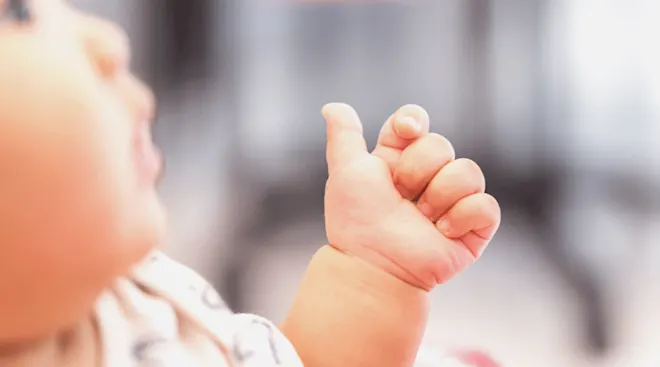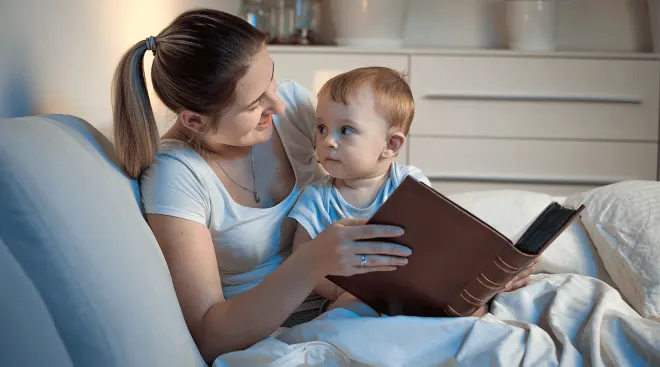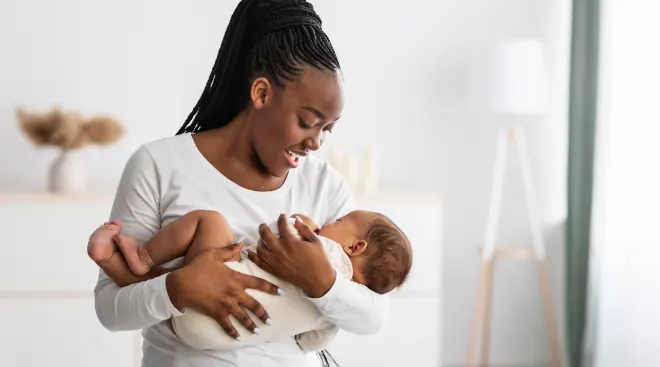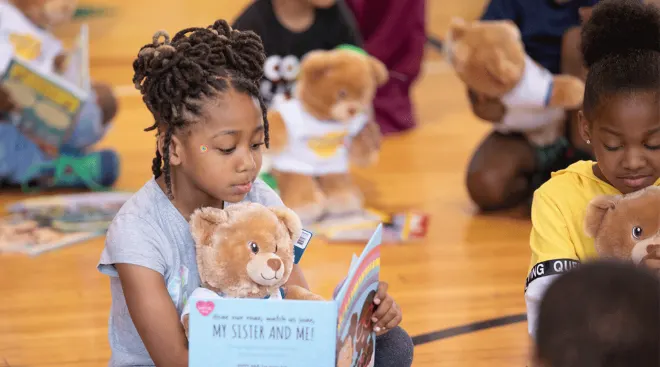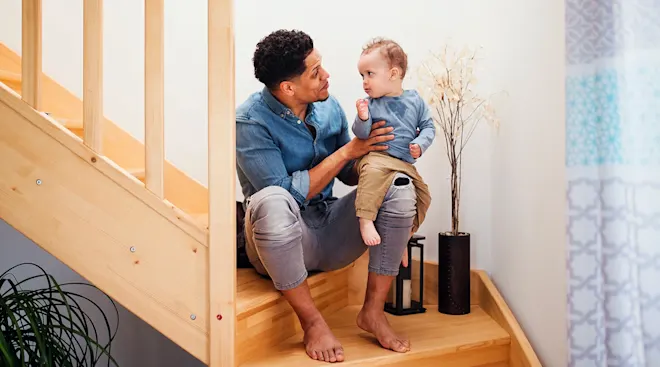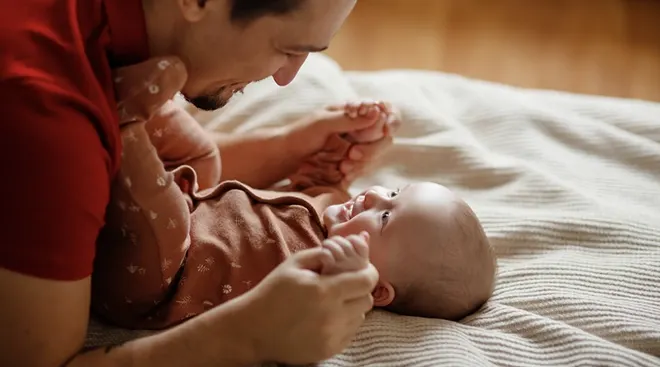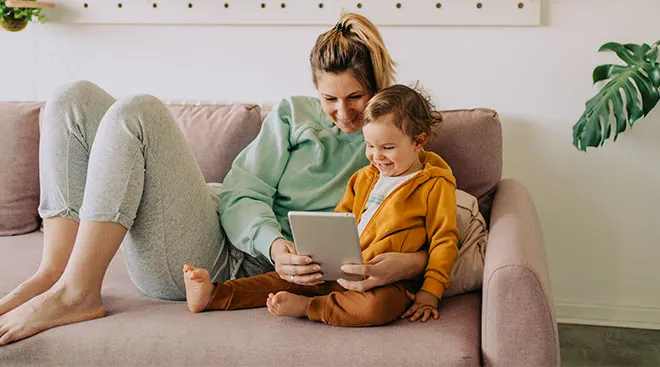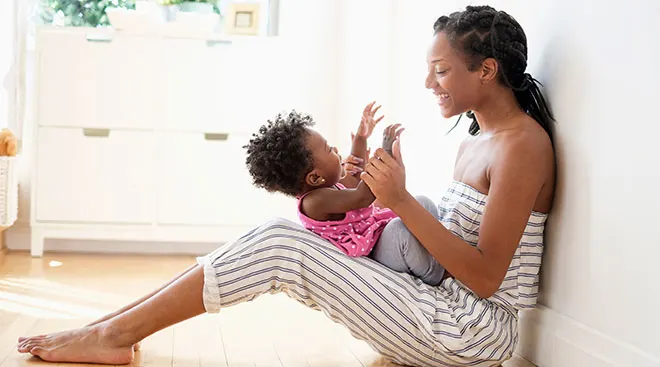How to Decode All Those Adorable (and Sometimes Worrisome) Newborn Baby Sounds
Babies communicate with us in various ways, but interpreting newborn baby sounds can be daunting. Some baby noises are undeniably joyful, some are downright worrisome and lots are somewhere in-between. Part of the challenge of parenting a newborn is learning to decipher their noises and cues. We’ve gathered some insights from experts to help ease your worried mind.
Crying is one of the most activating sounds a baby can make. However, not all baby crying is a distress signal. It’s simply the only tool a newborn has to communicate their needs (or opinions). Newborn crying can sound like whimpering, wailing or fussing and vary in pitch and volume. According to Cherilyn Davis, MD, FAAP, a board-certified pediatrician at Elliston Pediatrics in New York, babies can cry for many reasons—hunger, tiredness, discomfort, frustration—and sometimes for no reason at all.
“They may also cry if they’re overstimulated—they can’t filter out background noise like the hum of a refrigerator the way adults are able to,” she says. “It’s impossible to always know why your baby’s crying. As baby gets older, their cries may change—they may sound more dramatic or louder—and you might be able to tell what type of cry indicates what they need, whether it’s space or a cuddle.”
Emily Kukla, MA, CC-SLP, a speech-language pathologist and founder of Moms Teach Speech, says, “The best thing [parents] can do is always respond to their baby’s cries, even if they don’t know what it means.” If baby’s crying seems pain-related or excessive, it’s always best to seek the opinion of a trusted pediatrician.
Hearing baby squeal in delight is pure joy. The unmistakable high-pitched sound often means baby’s happy, says Amy Zembriski, MBA, MS, CCC-SLP, a speech-language pathologist and founder of Speech Therapy Connections. “You won’t miss it when these start to happen—they can get loud!” she says.
However, not all squeals are due to excitement. According to Davis, babies may also squeal when unhappy. She also differentiates a true squeal from a high-pitched sound called stridor: “If baby’s making a high-pitched squealing sound when they’re resting comfortably, it may mean that they have what’s known as ‘stridor.’ Stridor can happen when there’s floppy tissue that partially blocks baby’s airway and makes that squeaky sound,” she says. “It usually isn’t anything to worry about. And it tends to go away on its own by the time baby turns one year old as their tissues develop.” As with any worrisome baby sound or phenomenon, consult your doctor about any high-pitched noise that feels out of the ordinary.
Grunting is another newborn sound that can carry many meanings. I learned on the night my daughter was born that babies can grunt like tiny piglets while sleeping. They can also do so while trying to poop, which Davis describes as a full-body workout for them. “Sometimes babies will grunt before they spit up. And often, they’ll make this sound when they’re just exploring their voice,” she says. “If baby’s grunting with every breath and they look uncomfortable, it may be a sign that something more serious is going on and you’ll want to seek immediate medical attention.”
Growling is perhaps the most surprising baby sound on this list. I, for one, did not expect to hear my (confirmed human) baby growling as a newborn. “In the first six months, baby may discover that they can growl—and they may do it to indicate that they’re playing with you,” says Davis. “Or they may just do it reflexively. They may also like the sensation that it produces in their throat.”
Zembriski adds: “This ‘throaty’ sound they start to use is nothing to be alarmed about, I promise! Babies may do this because they actually enjoy the way it feels or they enjoy the way it sounds. This is something that’s good for them to do, as it means they’re experimenting with their vocalizations and learning all the different sounds they’re able to make with their voice.”
Panting is a newborn noise that can be quite worrisome at first. However, a baby’s quick breathing pattern is not always a cause for concern. According to Davis, “If you notice that baby is taking very rapid breaths from time to time, don’t be alarmed. Panting is also known as ‘periodic breathing,’ and it’s basically the process of baby learning how to better regulate how they breathe.”
There are times it might be good to get the opinion of a doctor, though: “If baby is panting with every breath for longer than a minute or so, it may be a sign that they’re struggling to breathe. In this case, you’ll want to seek medical attention as soon as possible,” says Davis.
Hearing baby giggle or laugh for the first time is a heartwarming feeling and an exciting early milestone. You’ve smiled and laughed in baby’s direction for months, and they’re finally able to join in on the fun. Typically, baby will give you their first little chuckle when they’re around 4 months old. “It may not even seem obvious at first,” says Davis. “But if you listen closely, it’ll sound like a small laugh.”
Zembriski urges parents to engage with babies when they laugh. “Make sure to respond to their giggles with language models and excitement! For example, if they’re laughing with you while you’re playing peek-a-boo, continue to engage in that activity.”
Cooing is a sweet sound that newborns make to practice using their voices, and it typically indicates happiness, experts say. “Cooing will be primarily different combinations of vowel sounds like ‘aah’ and ‘ooh,’” says Kukla. “You can think of that classic baby sound effect ‘aah-ooh-ah-wa’ as a great example of cooing.” She adds that cooing can be a form of exploratory play for babies. “It’s how they learn about the world around them, and also about what their bodies are capable of,” she says.
Davis adds, “Babies will coo when they’re exploring and learning about their voice. Eventually, they learn that they can expand these sounds, and that’s when they start making new and different ones!” Zembriski encourages engaging in a “cooing conversation” with baby. “This back-and-forth you create shows them the idea of reciprocity, which means that your baby is starting to learn that when they make a sound, someone will respond back to them!”
Babbling is an exciting baby milestone that’s an important step toward talking. “Roughly around 4 to 7 months of age, babies tend to start to babble, meaning they add consonants to the vowels to make sounds like ‘ma’ or ‘ba’ or ‘da,’” says Davis. “And they may start stringing these sounds together to say ‘ma-ma-ma’ or ‘da-da-da’.” (All so they can eventually say mama and dada!)
The nature of baby’s babbling changes over time. “You may notice that baby makes different tones and they may vary their volume, which is a sign that they’re learning how to produce language—and how you respond to the different words and sounds they make,” says Davis. Kukla adds: “Around 4 to 6 months old, babies start to get more intentional with using these sounds for communication and they’ll start to babble with a specific purpose, like to get attention. During this stage, they’ll also start taking turns ‘talking’ with you—babbling, waiting for you to respond and then babbling more.”
Newborn brains are truly wonders, learning and growing at the speed of light (or sound). Babies do their best to communicate, and as their parents, we can do our best to respond with curiosity—even when we don’t fully understand what their sounds mean.
Please note: The Bump and the materials and information it contains are not intended to, and do not constitute, medical or other health advice or diagnosis and should not be used as such. You should always consult with a qualified physician or health professional about your specific circumstances.
Plus, more from The Bump:
Cherilyn Davis, MD, FAAP, is a board-certified pediatrician at Elliston Pediatrics in New York. She earned her medical degree from Sidney Kimmel Medical College in Philadelphia.
Emily Kukla, MA, CC-SLP, is a speech-language pathologist and founder of Moms Teach Speech.
Amy Zembriski, MBA, MS, CCC-SLP, is a speech-language pathologist and founder of Speech Therapy Connections.
Learn how we ensure the accuracy of our content through our editorial and medical review process.
Navigate forward to interact with the calendar and select a date. Press the question mark key to get the keyboard shortcuts for changing dates.







































